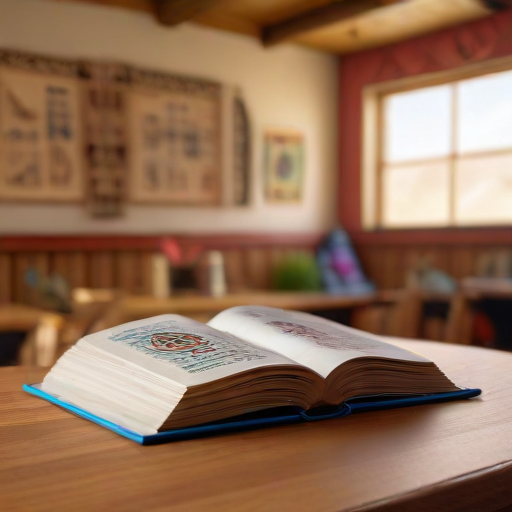DETROIT LAKES — On November 12th, the Detroit Lakes Middle School was abuzz with energy as students filled the entrance with laughter and excitement. Amid the joyful chaos, a vibrant banner celebrating National Native American Heritage Month was prominently displayed on a stone wall, a symbol of the school district’s ongoing commitment to honoring American Indian contributions.
For several years, the Detroit Lakes Public School District has actively celebrated Native American Heritage Month. Joe Carrier, the American Indian Education Program Coordinator, emphasized that this month is about recognizing the contributions of Native Americans today, rather than solely focusing on historical depictions.
Throughout November, the district organizes various events and activities aimed at engaging students with American Indian culture. Activities include crafting dreamcatchers and beaded bracelets, along with “Rock Your Mocs” days where students wear traditional moccasins. Collaborating with the White Earth Reservation, the White Earth Land Recovery Project, and White Earth Tribal and Community College, educators bring in speakers and facilitate unique experiences for students.
While Native American Heritage Month is a focal point, Carrier noted that the schools strive to incorporate indigenous culture into their everyday curriculum. Each month features a focus on one of the Seven Teachings of the Ojibwe: love, respect, courage, honesty, wisdom, humility, and truth. This ongoing curriculum initiative began in October and will continue through April, culminating in a review of all learned teachings in May.
The American Indian Student Council (AISC) plays an integral role in promoting cultural education, engaging in community service, and fostering connections with local elders. AISC members also read to younger students, creating a bridge between generations and enriching the learning experience.
With nearly 20% of the student body identifying as Native American, Carrier highlighted the importance of representation. When Native American students see themselves reflected in their educational materials—authored by Native Americans and featuring Native characters—they are more likely to feel engaged and connected in their learning environment.
Melanie Holmquist, an American Indian college and career facilitator, noted that these efforts enhance inclusivity, encouraging an environment where curiosity about indigenous culture is met with understanding rather than apprehension.
Hailey Petersen, AISC president and a senior at Detroit Lakes High School, welcomed all students to join the council, dispelling the notion that participation is exclusive. This openness fosters a collaborative spirit where everyone is encouraged to learn about and engage with Native culture.
In a notable initiative led by math teacher Karen Trout, a wall displaying the accomplishments of prominent American Indians has evolved to include photos and biographies of diverse figures, reinforcing representation within the school community. Trout encourages anyone with suggestions for Indigenous figures to contribute, promoting a sense of visibility and pride among students.
Carrier announced that upcoming events, such as the Young Artists/Young Writers series, will invite all students to showcase their cultural creativity, while a quiz bowl will challenge their knowledge of Native culture in a spirited competition. Additionally, a spring powwow is scheduled for March 13, providing an opportunity for learning and further cultural immersion.
As Holmquist remarked, the community has made significant strides in fostering an inclusive environment, inviting curiosity and participation from all. The ongoing commitment to cultural education and representation in Detroit Lakes schools is not just a celebration of heritage but also a meaningful step toward bridging gaps and promoting understanding within the wider community.
In conclusion, the Detroit Lakes Public School District’s celebration of Native American Heritage Month and its commitment to cultural education highlights the importance of representation and inclusivity in schools. These initiatives not only educate students about the rich heritage of American Indians but also forge connections across communities, fostering a more understanding and engaged society.
